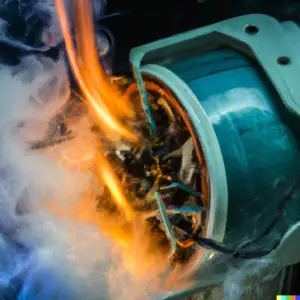As we rely more and more on electrical equipment in our daily lives, it is important to take proper care of them to ensure they last as long as possible.
Whether it’s a simple appliance like a toaster or a more complex piece of machinery like a computer, regular maintenance can help extend the lifespan of your electrical equipment.
In this article, we will discuss some tips and tricks for maintaining your electrical equipment, so that you can get the most out of your investment.
Table of Contents
Keep it Clean Dirt
Dust, and other debris can accumulate inside electrical equipment and cause it to overheat or malfunction.
To prevent this, make sure to regularly clean your equipment. Use a soft, dry cloth to wipe down the exterior, and gently vacuum or blow out any dust or debris from the vents or other openings.
Check the Power Supply
One of the most common causes of electrical equipment failure is a problem with the power supply.
To prevent this, make sure to regularly check the power cord and plug for any signs of damage, such as frayed wires or bent pins. If you notice any damage, replace the cord or plug immediately.
Using the incorrect voltage or current can still result in several problems, such as:
- Underpowering: The equipment may not function correctly, or it may not work at all if the power supply’s voltage or current is insufficient.
- Overheating: If the power supply’s voltage or current is too high, it can cause the equipment to overheat and damage its internal components.
- Short-circuiting: Using an incorrect power supply can create a short circuit, which can damage the device’s components or even cause a fire hazard.
- Electrical interference: The wrong power supply can also cause electrical interference, leading to reduced performance or even complete failure of the equipment
Therefore, it is crucial to use the correct power supply as specified in the device’s manual to ensure its safe and efficient operation.
Avoid Overloading

Overloading electrical equipment by plugging too many devices into a single outlet or power strip can cause it to overheat and fail.
To prevent this, make sure to only plug in as many devices as the outlet or power strip can handle.
If you need to power multiple devices, consider using a surge protector or a separate outlet.
Overloading electric equipment can cause a range of problems that can shorten its lifespan and increase the likelihood of failure. To avoid overloading your electrical devices, it is important to use them only within their recommended specifications and to ensure that you are using the correct voltage and amperage for the device.
Here are some examples of overloading home appliances:
- Plugging too many devices into a single power outlet: If you plug too many devices into a single power outlet, you risk overloading the circuit. This can cause the circuit breaker to trip or, in extreme cases, start a fire.
- Using a high-wattage bulb in a lamp: If you use a bulb that has a higher wattage than the lamp is designed for, it can generate too much heat and cause the lamp to overheat, which can be a fire hazard.
- Overloading a washing machine: If you overload a washing machine with too many clothes, it can strain the motor and cause it to wear out faster than it otherwise would. This can lead to the need for repairs or a replacement sooner than expected.
- Overloading a refrigerator: If you put too much food in a refrigerator, it can cause the compressor to work harder than it should, leading to increased wear and tear on the unit and a shorter lifespan.
- Overloading an air conditioner: If you set your air conditioner to a temperature that is much lower than the outside temperature, it will have to work harder to cool your home, which can lead to increased wear and tear and a shorter lifespan.
Keep it Dry
Moisture can damage electrical equipment and cause it to fail. To prevent this, make sure to keep your equipment away from any sources of moisture, such as sinks or windows.
If you need to use your equipment in a damp environment, consider using a protective cover or enclosure.
Schedule Regular Maintenance
Regular maintenance is key to keeping your electrical equipment in good working order. Depending on the type of equipment, this may involve cleaning, lubrication, calibration, or other tasks.
Professional maintenance is essential in extending the lifespan of your electrical equipment.
Consult the manufacturer’s instructions or a qualified technician for guidance on the appropriate maintenance schedule for your equipment.
They can check for any issues that you may have missed and provide professional cleaning to keep your equipment in tip-top condition.
Read the User Manual
The user manual contains important information about your electrical equipment, including how to operate and maintain it properly.
It provides specific instructions on how to use the equipment safely, which will help you avoid costly repairs or even replacement due to damage caused by misuse.
Take some time to read the manual, and you’ll find it easier to maintain your equipment.
Clean and Dust Regularly
Dirt and dust can cause problems in electrical equipment, including overheating, circuit failure, and mechanical damage. Therefore, it’s essential to keep your equipment clean and dust-free. Wipe down your equipment regularly using a soft cloth or brush.
You can also use compressed air to remove dust and dirt from tight spaces. For more information read my comprehensive article The hidden danger of dust and how it impacts ODP motors.
Use Proper Storage
Improper storage can damage your electrical equipment, causing it to malfunction or break down. When storing your equipment, ensure that it’s in a dry, cool, and clean environment.
Avoid storing it in dusty or damp places or exposing it to direct sunlight. Also, ensure that the equipment is unplugged before storage to prevent electrical damage.
Regular Inspection
Inspecting your electrical equipment regularly can help you identify potential problems before they become severe.
Check for frayed cords, damaged plugs, or loose connections. If you notice any signs of damage, replace them immediately to avoid further damage to your equipment.
Use Proper Power Protection
Power surges and voltage spikes can cause significant damage to electrical equipment. Therefore, it’s crucial to use proper power protection devices, such as surge protectors or uninterruptible power supply (UPS).
These devices help protect your equipment from sudden voltage changes, preventing damage and prolonging their lifespan.
Don’t Overuse Your Equipment

Overusing your electrical equipment can cause overheating and burnout, leading to failure or damage. Therefore, it’s essential to use your equipment as intended and not to overload them with excessive use.
Allow your equipment to rest between uses, especially for items like refrigerators, air conditioners, and washing machines.
conclusion
By following these tips and tricks, you can extend the lifespan of your electrical equipment and avoid costly repairs or replacements.
Remember to always prioritize safety when handling electrical equipment, and if you are ever unsure about how to perform maintenance or repair tasks, seek the help of a qualified professional.
Install my Free Android App on Google Play:
Electrical Cables Most Common Tables
And, my Electrical Calculations App “”
Discover more great content by subscribing to My channel
Looking to stay ahead of the game in the world of electrical engineering? Subscribe to my YouTube channel and gain access to exclusive content you won’t find anywhere else!
The staff I recommend
(Amazon Affiliate Links to products I believe are high quality):
- Economy 120 Volt/60Hz AC Power Source – Step-Down Voltage & Frequency Converters 1800W
- UNI-T Digital Multimeter Tester UT139C
- 50-Amp Extension Cord for RV “100ft”
- Voltage Stabilizer 110/220v
- Hair Dryer “best selling“
- TOSHIBA EM131A5C-BS Countertop Microwave Ovens
Disclaimer: This contains affiliate links to Amazon products. I may earn a commission for purchases made through these links.


